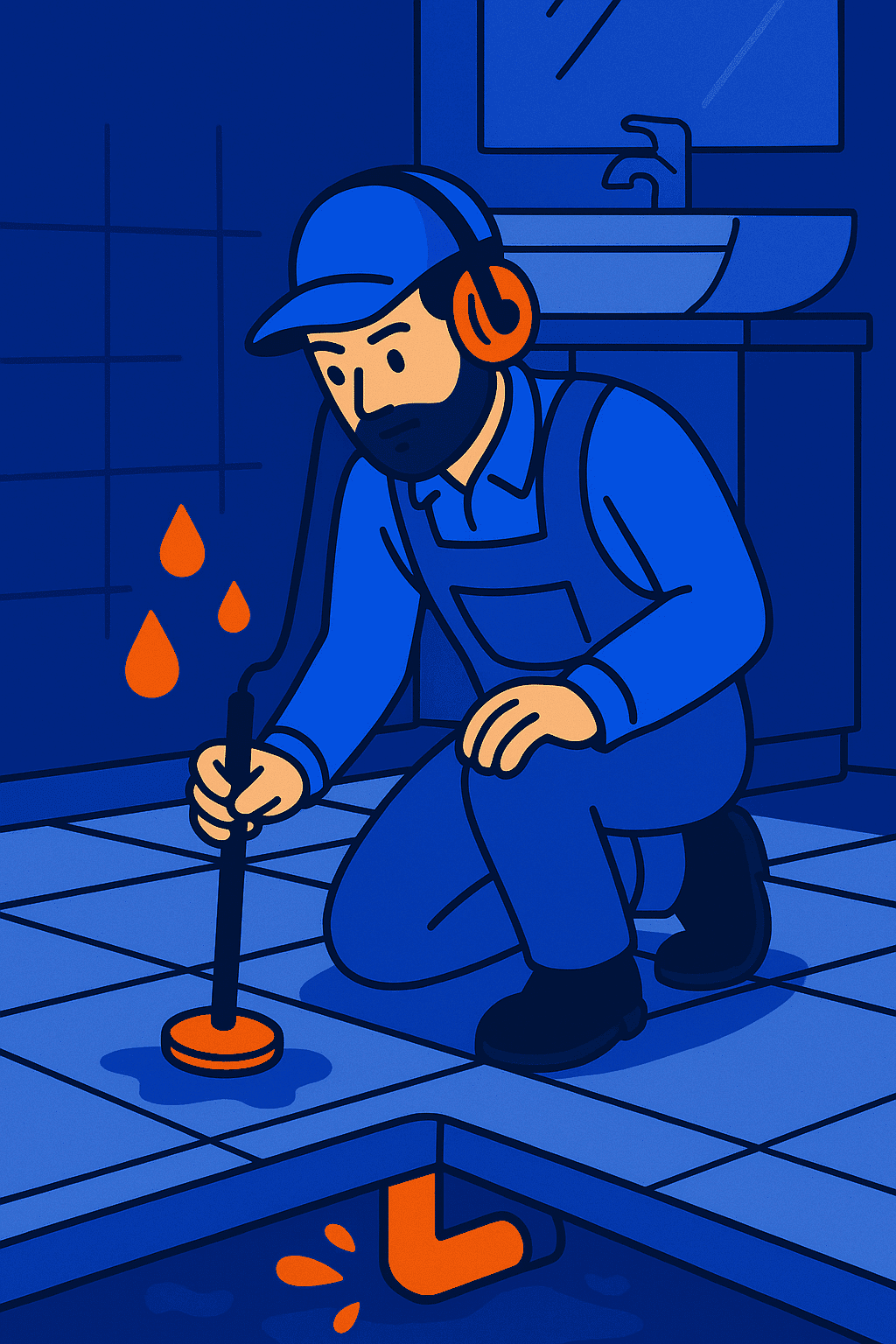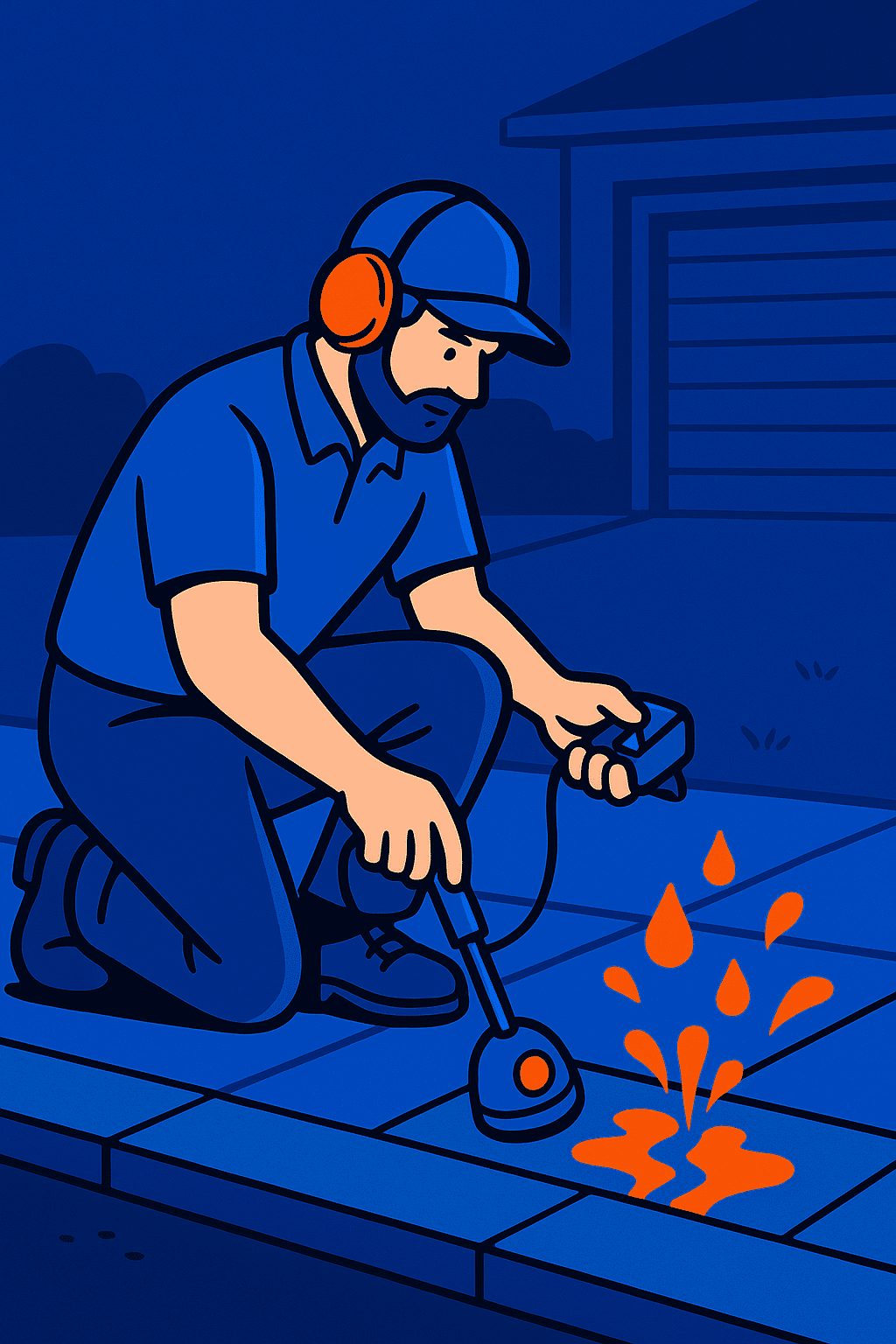Slab Leak Detection Specialists
Expert Slab leak detection services in Cornwall & Devon.
Contact Us Today!
Fast Reply Within 2 – 20 mins 🚀
↓ RESOLVE YOUR LEAK TODAY ↓
Slab Leak Detection in Cornwall & Devon
That warm spot on your floor could be a hidden disaster – with specialist tools, I'll find your slab leak without jackhammering your concrete
📞 Call Now: 07822 025 911Sensing a slab leak under your concrete floor? After 30+ years hunting leaks in Cornwall and Devon, I've seen how these hidden water leaks under concrete slabs can erode foundations and spawn mould – wasting 200 litres daily. Whether it's a hot water pipe weep causing warm spots or a cold line dampening your garage, my non-invasive kit locates it precisely without breaking your floor.
As a slab leak detection specialist, we use acoustics and thermal imaging to pinpoint issues accurately. No more destructive digs that ruin your home. If you're noticing cracks or damp, our concrete slab leak detection resolves it efficiently. For related floor issues, see our underfloor heating leak detection services.
Slab leaks are particularly tricky – pipes embedded in concrete mean no easy access, and early signs like damp or cracks are often dismissed. In the Southwest's damp climate, these leaks accelerate mould growth, affecting health and structure. According to HSE, untreated damp from leaks causes respiratory issues – early slab water leak detection is key.
Many homes in Devon have post-war slabs with copper pipes prone to pinholes from acidic water. In Cornwall, shifting granite foundations crack lines. Our approach addresses these local factors, ensuring thorough detection.
How We Detect Slab Leaks Without Destruction
Concrete slab leak detection needs finesse – water under pressure creates sound and heat signatures. We combine three methods for 98% accuracy.
Acoustic Detection
Mics listen for escape noise through concrete at 400-2000Hz. Ideal for pressurised lines per WRAS – locates within 0.5m.
Thermal Imaging
FLIR cameras spot temp anomalies from leaks. Perfect for hot water slab leaks showing warm spots. We use this in thermal imaging leak detection.
Tracer Gas
Inert gas injected; detectors find escapes in cold lines. Essential for waste pipes under slabs. See our tracer gas leak detection for hidden leaks.
We start with pipe mapping to trace routes under slabs, then apply methods. This avoids blind digging. For heating, thermal shines; acoustics for mains. In damp Southwest, tracer gas cuts through moisture interference.
Our kit includes high-res thermal cameras for fine detail. We also use moisture meters for confirmation, providing comprehensive evidence.

8 Signs of a Slab Leak
Slab leaks cause damage yearly – spot these early to protect your home in humid Southwest conditions.
From hot water leaks
Moisture seeping up
Unexplained rise
At taps from loss
On walls or floors
From erosion
Near baseboards
From trapped water
⚠️ Quick Test:
Turn off water; listen for running sounds or check meter movement. If active, leak under slab is likely. Call us – early find prevents mould. (HSE mould info)
These signs often start subtle but escalate fast in damp climates. Warm spots indicate hot leaks, damp cold ones. Cracks from erosion weaken structures – in Cornwall basements, mould spreads quickly.
For heating slabs, signs include boiler pressure drops. In Devon new builds, poor install causes many cases.
Our Slab Leak Detection Process
Safe, systematic method avoids floor damage.
Phone Assessment & Quote
Discuss signs like warm spots or damp. Fixed price based on floor type.
On-Site Detection
Isolate system, then acoustics/thermal/tracer to locate. Adapt for concrete thickness.
Repair Recommendations & Report
Marked spot with images; advice on rerouting or epoxy. Insurance docs provided.
Process takes 1-3 hours typically. We use pressure tests first to confirm leak size. For waste slabs, tracer gas avoids odours. Reports include flow rates for claims.
Post-detection, we discuss options like pipe rerouting above slab to avoid break-up.
Trace and Access Insurance Claims
Policies cover detection under Trace & Access. Our reports secure approvals. We handle paperwork, linking to trace and access plumbers for insurance claims.
Insurers favour non-invasive – we provide thermal evidence. Clients get guidance on claims, ensuring smooth process.
Types of Slab Leaks We Detect
Hot Water Leaks
Warm spots; thermal finds fast. Common in heating slabs.
Cold Water Leaks
Damp areas; acoustics trace seeps. Mains under slabs cause pressure drops.
Waste Line Leaks
Foul smells; tracer gas locates. Sewer fails cause backups in garages.
Heating Pipe Leaks
Boiler issues; thermal spots in concrete. Link to central heating leak detection.

We also handle rare fire sprinkler leaks under slabs. In coastal areas, corrosion hits copper faster. Hot leaks show as warm floors, cold as damp. Waste cause odours, heating boiler drops.
Our methods cover all, from pinholes to bursts. Root intrusion in drains under slabs is common – prevention key.
Why DCI for Slab Leak Detection?
We detect precisely with advanced tech and local knowledge.
Advanced Tools
Thermal/acoustic kit – high accuracy
Insurance Support
Reports for claims
No Break First
Located without jackhammer
Regional Expertise
Know Southwest concrete – efficient
Complete Service
Detection to repair advice
Our non-destructive focus minimises disruption, with detailed evidence for peace of mind.
Slab Pipe Materials & Leak Patterns
Copper Pipes
Pinholes from corrosion; thermal spots in acidic soil.
PEX Plastic
Cracks from shift; acoustics detect seeps.
Cast Iron
Rusts internally; tracer finds breaks.
Galvanised Steel
Corrodes; multiple leaks common in old slabs.
Material matters – copper in moors leaks from acidity. PEX flexible but fails under pressure. Cast iron rusts over decades. Galvanised shows orange water first.
We advise replacements during detection for long-term fix. Understanding patterns helps choose methods – thermal for copper, tracer for PEX.
Common Causes in Cornwall & Devon
Soil shift (40% cases), corrosion from damp, poor install, roots, frost. Granite in Cornwall cracks lines; clay in Devon causes movement.
Soil shift from rain expands clay, cracking pipes. Corrosion in coastal salt air affects metal. Poor install leads to joint fails. Roots seek water, penetrating. Frost bursts in winter.
For gas under slabs, cross-check with gas leak detection. Urban areas see more install issues; rural root problems.
Your Slab Leak Action Plan
Spot signs? Act fast:
Isolate water
Turn off mains if hot leak
Ventilate area
For mould risks
Photo symptoms
For claims
Check insurance
Trace & Access
Call 07822 025 911
For detection
Ignore and face mould or cracks – one case led to full floor replacement in a week.
Preventing Slab Leaks
Tips to avoid future problems:
Annual inspections
Check for damp early
Pressure regulators
Prevent bursts
Soft water
Reduce corrosion
Monitor foundations
Spot shifts
Avoid roots
Plant away from slabs
Regular maintenance cuts risks per studies. Regulators balance pressure; softeners protect pipes. Foundation checks spot movement; root barriers prevent intrusion.
Environmental Impact of Slab Leaks
Leaks waste 200k litres/year – critical in drought areas. Cause pollution from mould chemicals.
Our detects save water. (CCW: report)
Addressing leaks reduces annual UK waste, aiding sustainability. In our region, conserves for communities. Prevents contamination too.
Ready to Detect That Slab Leak?
Stop the hidden damage. Our slab leak detection finds issues fast without mess. Contact for expert help.
📞 Call Now: 07822 025 911Cornwall & Devon
Reports • Non-invasive • Repairs
Serving Cornwall & Devon
From Saltash, rapid response across region. Plymouth to Penzance, equipped for your slab leak.
Expert Slab Leak Detection in Cornwall & Devon
Services in populated areas like:
Plymouth • Exeter • Truro • Torquay • Paignton • Barnstaple • Newton Abbot • St Austell • Falmouth • Penzance • Camborne • Redruth • Tiverton • Newquay • Brixham • Bodmin • Teignmouth • Helston • Bideford • St Ives • Dartmouth • Hayle • Tavistock • Saltash • Okehampton • Launceston • Totnes • Liskeard • Kingsbridge • Wadebridge
Frequently Asked Questions About Slab Leak Detection
What are the signs of a slab leak?
Look for warm floor spots (hot water leaks), damp under carpets, unexplained high bills, low water pressure, mould on walls/floors, cracks in concrete, hissing near baseboards, or musty odours from trapped moisture.
How do I check for a water leak under concrete slab at home?
Do a meter test: Shut off water, note reading, wait 2 hours without use – if moved, leak under slab is likely. Listen for hissing or use dye in drains to trace. For accuracy, call a slab leak detector; DIY misses 60% per Ofwat. Our non-invasive tools confirm without breaking floors.
What causes slab leaks in UK homes?
Corrosion from acidic soil (common in Devon’s moors), ground shift cracking pipes (40% cases in clay), poor installation joints failing, root intrusion, or frost bursts in winter. Ageing copper in post-war slabs leaks most – regular checks prevent escalation.
How do you detect slab leaks without damaging the floor?
We use acoustic mics for noise (400-2000Hz), thermal cameras for temp changes in hot leaks, and tracer gas for cold/waste lines. These locate 98% accurately without jackhammering – ideal for concrete slab leak detection. Methods adapt to Southwest dampness for precision.
Is slab leak detection covered by insurance?
Check your policy for ‘Trace and Access’ for escape of water – this covers specialist detection if causing damage.
What are the risks of ignoring a slab leak?
Erosion weakens foundations (causes cracks per 30% cases), mould affects health (respiratory issues, HSE), high bills from 200l/day waste, or structural collapse in severe. In humid Cornwall/Devon, damp spreads fast – prompt concrete slab leak repair prevents £thousands in fixes.
How does slab leak detection work for different pipe materials?
For copper (pinholes), thermal spots corrosion; PEX (cracks), acoustics detect; cast iron (rust), tracer gas finds breaks; galvanised (corrosion), combo methods. We adapt for material, ensuring accurate slab leak detection and repair recommendations.
